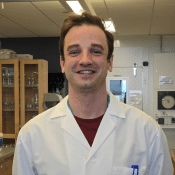Researcher Spotlight: Pierre Stéphan, MD, PhD
brigham and women’s hospital

Patients diagnosed with angioimmunoblastic T-cell lymphoma (AITL) face poor prognosis and limited treatment options. “We believe this is partly due to a lack of understanding of the complex set of local environmental factors that promote the growth and survival of lymphoma cells,” explains Dr. Stéphan. His research, therefore, aims to use advanced imaging and computational techniques to characterize the tumor microenvironment in AITL, with the goal of better understanding how this environment supports the growth and proliferation of tumor cells. “I hope this understanding will lead to the identification of new and rational targets for treating this disease, which in the long term will improve the lives of patients with T-cell lymphomas,” he says.
Dr. Stéphan completed his medical training at Dijon University School of Medicine in France before pursuing a PhD in immunology at the University of Lyon and the Cancer Research Center of Lyon. It was there where he committed to studying the role of the immune microenvironment in T-cell lymphomas. “I think studying T-cell lymphomas offers a rare opportunity to gain a deeper understanding of the immune system and its organization around T-cells, aiming to clarify the specific role of each cellular subtype and how we can leverage immune cells other than T-lymphocytes in the fight against cancer,” he explains.
“I am inspired by my patients – their strength, determination, and the trust they place in us, the doctors,” says Dr. Stéphan. “They are at the center of my work, and through this project, I want to contribute to their wellbeing. I’m also inspired by my mentors and colleagues, who throughout my career have shown a commitment to always improving the lives of our patients. Their dedication motivates me to keep pushing forward with this work.”
Dr. Stéphan is also grateful for the support of the greater Foundation community. “I would like to thank the Foundation as well as all the people behind it who contribute through their work, intellectual input, time, or financial donations to support lymphoma research,” he says. “Their efforts directly benefit patients and us, researchers and healthcare professionals. Thank you for the trust you have placed in me. It is both a privilege and an honor to be part of this team and to collaborate with you in shaping the future of lymphoma research.”
